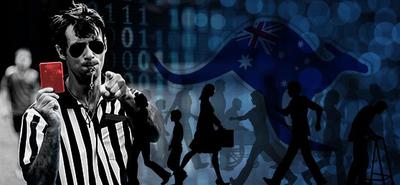Published Jan 11, 2020 by Xiph
Having “nothing to hide” can still cost you – eventually Friends, Australians, Countrymen, lend me your fears. And beware of doing anything wrong, it might ruin your life.

In “Nosedive”, the 2016 episode of anthology Sci-Fi television series Black Mirror, the social status of every human being is determined by a mobile device-based credit system. Every act, action and interaction is awarded a score out of 5 and an individual’s cumulative score determines their societal worth. Got the grumps while buying a coffee and a barista will punish you with a low score. Greet a passer-by with a pleasantry (as long as it’s deemed genuine) and you’re rewarded with a higher score. Those with higher cumulative scores form the elite – determining whether you’re worthy of purchasing a decent property for example. Those with lower cumulative scores are banished to the fringes of society.
Only four years since that episode aired and our world is quickly beginning to resemble that fictional scenario – except in a far less entertaining fashion
Introducing… social credits.
Where did this all start and is it working for or against society?
For the past few years, Chinese authorities have been developing and intensifying their trial of a social credit system (SCS). A nation-wide programme that George Orwell would have been proud of concocting…that is, if it were a fictional construct. In simple terms, the system, as perfectly expressed by abc.net.au: “is designed to monitor and engineer better individual and business behaviours by awarding the trustworthy and punishing the disobedient.” How is the difference between trustworthiness and disobedience determined? Through the gathering and scrutinising of personal data, of course.
At present, in lieu of (allegedly) eventually targeting the private behaviours of our upstanding Chinese neighbours, the social credit system has been actively trialled in the business world. The SCS is comprised of three conjoined exploits:
- A master database (into which governments, state agencies, banks and a long list of other entities all feed an individual’s data)
- A blacklisting system (if an individual or a company are non-compliant in one area, however inconsequential, they face restrictions in other areas of their lives. This system is searchable by the general public)
- A punishment and rewards mechanism (Caught jaywalking? Lose credits)
Of course, all three aspects are far more complex than that but the fact of the matter is that an unassuming individual with a lower credit score will have more trouble planning a holiday if they are deemed to have done something wrong.
The social credit system is determined through a variety of data-collection methods, but perhaps the most powerful is the widespread use of CCTV with facial recognition capabilities. In other words, wherever you go and whatever you do, your face (rather than being your passport), could be your ultimate downfall.
Okay, but we’re in Australia, the lucky country!
And so, it seems, we’re less vigilant by nature. The SCS’s (that, in China, is set to broaden in scope and extend in reach from 2020 onwards) influence has already been felt 7,470km south to the second top-most tip of our great nation. Darwin, NT.
You may have heard about the “Indue” card. An innocent-looking piece of plastic that’s been trialled in NT indigenous communities as a means of Big-Brother’ing the spending habits of First Australians. With an Indue card, the government can ensure that Indigenous Australians are less likely to have access to cash and are only able to spend money on necessities – instead of alcohol, cigarettes or gambling. Where might this lead? Want to celebrate your Aunty’s 80th birthday with a nice bottle of Pinot Noir? Nope. Best you buy a toothbrush and a roll of toilet paper instead.
It’s no exaggeration that Darwin, thanks to the use of data as a means of control, is falling to a brave new world of social engineering. In 2019, the NT government earmarked $1.4 million to expanding its CCTV army, enough to take a leaf out of China’s facial recognition manifesto. Where does it end?
Darwin is not just an anomaly, it’s the beginning of a social engineering evolution. The rest of the nation has been under the laser gaze of the Robodebt programme – a colossal failure of technological automation that sent letters to those on Centrelink demanding money due to the claim that they had been overpaid (they hadn’t). This endeavour is emblematic of the future of Australia – cutting costs by relying on AI to do work without accounting for nuance, situational specifics, or, you know, basic human decency. And let’s not even go into the government’s recent amendments to the Telecommunications Act or absurd relaxing of encryption laws… you can read about it here.
Unfortunately, in a few years’ time, everyone who’s read this article might be flagged, placed on a blacklist, and whatever’s left of their social credits will take a nosedive.
It could happen so protect your data and your right to privacy.
Posted in: Security


